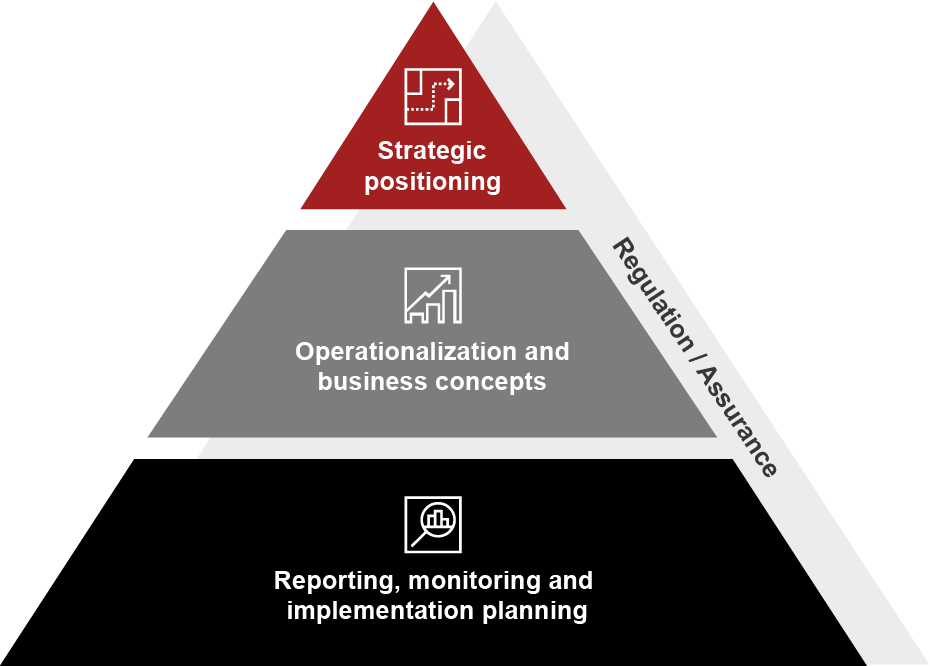Case study
SIXT: Advisory project on sustainable mobility
PwC Germany and Strategy& accompany SIXT on its way towards a pioneering role in sustainable mobility.
SIXT SE is one of the world’s leading mobility providers who offers premium mobility services in private and commercial vehicle rental, car sharing, ride hailing and as car subscriptions. With its presence in more than 100 countries around the globe, a revenue of EUR 2.28 billion in 2021, it is among the largest mobility companies worldwide.
There is growing pressure from consumers, investors and legislators on the mobility industry to contribute to reducing emissions. Therefore, the transformation to sustainable e-mobility plays a vital role in the fight against climate change to achieve the 1.5°C goal of the Paris Climate Agreement.
SIXT aims to be a pioneer in sustainability, going beyond mere compliance with regulatory requirements. As SIXT has been pointing out recently, it is the company’s ambition to make a significant contribution to reducing road traffic and, in doing so, to significantly improve the quality of life in cities. The company’s aim is to realize this through an attractive mix of mobility services with a focus on shared mobility and e-mobility.
SIXT chose a joint team of PwC Germany and Strategy& consultants to support the company on its ESG transformation as trusted advisors from strategy through execution.
Making SIXT sustainable, from strategy through execution
With the power of the combined PwC Germany and Strategy& expertise, we advised SIXT on its target to making green mobility a reality, and act as a trustworthy and collaborative transformation partner.
We support SIXT in assuming a differentiating pioneering role in the field of sustainable mobility,
... help SIXT to anchor its strategic ESG goals organizationally in order to effectively manage the ESG transformation,
and enable SIXT to credibly and authentically communicate the progress of the ESG transformation along relevant KPIs

Two project phases
Phase 1 - Development of SIXT’s strategic ESG positioning
- Thanks to an ESG upskilling program as well as a competitive benchmarking, SIXT was able to build up ESG expertise internally and to develop its own strategic thrusts for the ESG strategy
- Through a comprehensive strategic materiality analysis, the PwC Germany and Strategy& team helped SIXT identify 14 ESG issues from both an external and internal stakeholder perspective, being highly relevant for its ESG transformation
- Additionally, the consulting team supported SIXT in the development of an ESG reporting narrative as part of the 2021 non-financial statement.

Phase 2 - Integration of ESG into business and management processes
- PwC Germany and Strategy& identified business areas typically affected by ESG issues, for SIXT to realize that the organization is exposed to ESG in almost all areas
- Based on this, the consulting team conducted structured interviews with 24 SIXT representatives at division and department head levels to analyze potential areas of improvement of the current ESG approach, and at the same time raise awareness for the topic
- This allowed for the design of the company’s ESG governance, ESG target operating model (TOM) and ESG system landscape with PwC Germany and Strategy& involved as trusted advisors
New ways of working
The PwC Germany and Strategy& approach is based on active moderation, trustful communication as well as the application of new ways of working:
Project results
With the completion of phase 1, SIXT developed the basis for a successful ESG strategy. Through the development of the strategic positioning and the identification of material ESG topics, SIXT, with the advice from PwC Germany and Strategy&, has laid an important foundation for communicating the progress of the ESG transformation credibly and authentically both internally and externally in the future. At the same time, SIXT is already benefiting from the fact that employees have a better understanding of the ESG transformation and feel involved in it.
The ESG transformation of SIXT is expected to have far-reaching consequences for the entire company. Involving employees in more than 30 workshops and interviews has raised awareness of ESG and provided expertise. The integration of the ESG strategy into business and management processes is supposed to enable SIXT to successfully manage its own transformation and keep all stakeholders informed of progress.
The clear goal is that with the completion of phase 2, SIXT will be empowered to drive the transformation in the coming years through a powerful yet efficient ESG organization, including a suitable governance and system landscape. This represents an important milestone on the way to becoming a pioneer in the field of sustainable mobility.
Status quo of SIXT’s ESG strategy
With its four-dimensional sustainability strategy, SIXT aims to foster enthusiasm for e-mobility among its customers by focusing on the electrification of its vehicle fleet, investing in charging infrastructure, optimizing the SIXT App as a hub for climate-friendly mobility offerings, as well as making branches and sites operate net-zero until the end of 2023.
SIXT’s sustainability strategy is based on four pillars:
70 to 90 percent of SIXT’s vehicles in Europe will be electrified by 2030. SIXT is relying on a broad mix of manufacturers and models to achieve this and wants to accelerate enthusiasm for e-mobility. A survey among SIXT customers shows that around 70 percent believe that the use of rental cars can reduce reservations about e-mobility.
By investing EUR 50 million, SIXT is significantly expanding its own charging infrastructure at its branches. Partners will be integrated into the SIXT App to give customers access to up to 300,000 charging points in SIXT’s European corporate countries during their rental, with SIXT charge.
Today, the SIXT app and the underlying mobility platform ONE are already in place to enable an easy and flexible use of SIXT offers. The spectrum ranges from classic rental cars (SIXT rent) and car sharing (SIXT share) to ride-hailing services (SIXT ride) and car subscription (SIXT+). SIXT’s goal is to provide maximum flexibility in the individual customer’s own mobility – even without one’s own vehicle. SIXT wants to further expand this offering and continue to scale its platform into an ecosystem for sustainable mobility.
SIXT aims to reduce its CO2 emissions as quickly and as far as possible – by installing its own photovoltaic systems over a large area, for example. What cannot be saved on site, is supposed to be compensated for through high-quality offset projects. For example, SIXT has set itself the goal to make the operation of its branches and sites climate-neutral by the end of 2023 – five years earlier than planned.




